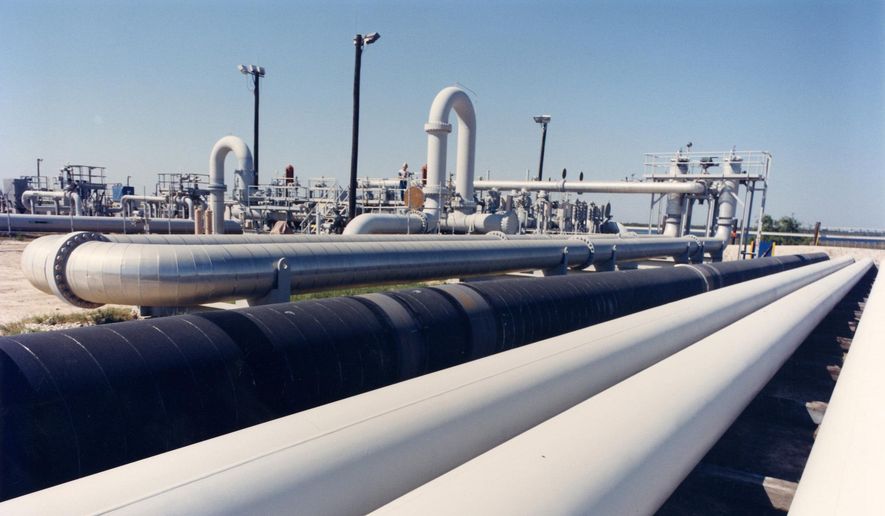House Republicans want to haul in Department of Energy officials to examine the Biden administration’s handling of the Strategic Petroleum Reserve (SPR) and recent overseas sales of domestic stocks despite near-record U.S. gasoline prices.
The sought-after hearing, which the majority of Democrats are not likely to approve, highlights the sort of investigations that Republicans plan to open into the administration’s energy policies if the party retakes control of the chamber after the midterm elections.
In a letter sent Tuesday to House Energy and Commerce Committee Chairman Frank Pallone Jr., New Jersey Democrat, and first shared with The Washington Times, GOP Reps. Fred Upton of Michigan and Markwayne Mullin of Oklahoma cited national security as the crux of of why an oversight hearing is needed.
“Selling off our strategic stockpile is not a solution to high gasoline prices, and when it is exported to our foreign adversaries, it further harms our economy and national security,” the Republicans wrote.
Under current law, the sales were required to be made to the highest bidder, so long as the buyer is not sanctioned. Republicans have since introduced bills to prevent future sales to foreign adversaries.
Mr. Pallone did not immediately respond to a request for comment.
The GOP lawmakers want to probe what they call the administration’s “mismanagement” of the emergency petroleum stockpile and how officials will replace the 260 million barrels planned for release by the midterm elections as part of a broader effort by President Biden to blunt high prices at the pump.
In March, Mr. Biden announced an unprecedented release of 1 million barrels of oil per day for six months from the SPR, totaling 180 million barrels. When paired with prior releases, the administration will have released 260 million barrels into the market from October 2021 through October 2022.
The latest release came as the administration was instituting a ban on Russian oil over its war against Ukraine, a war that has helped send global oil prices skyrocketing.
The release is expected to drain the SPR to its lowest level since March 1984. As of earlier this month, the stockpile was just over 485,000 barrels, according to the Energy Information Administration.
The Biden administration has also sold more than 5 million barrels from the SPR to Europe and China in recent months, angering critics who have questioned the national security implications and how it helps achieve the goal of driving down fuel costs. China is in the midst of boosting its oil reserves.
Mr. Biden has been accused by Republicans of playing politics with the U.S. stockpile by using it to try and lower gasoline prices. Administration officials say that, because U.S. pump prices are tied to the global price for crude oil, even selling reserves to foreign buyers such as China has a direct impact on lowering the cost of gas at home.
They have also noted that the non-sanctioned foreign entities outbid domestic buyers and were thus they were legally required to make the sales.
“This stockpile was meant for emergency purposes, not as a Band-Aid for or distraction from bad policy,” Mr. Mullin said in a statement.
Mr. Upton argued that the issue is under the direct purview of the panel to investigate.
“The fact our strategic petroleum reserve is being depleted at the same time China is building its reserve is something Congress must review,” he said.
House Republicans have previously made requests for more information from Energy Secretary Jennifer Granholm about a long-term plan to replenish the depleted SPR, requests which GOP lawmakers say have gone unanswered.
The Energy Department outlined plans in May for a buyback bidding process to purchase the first 60 million barrels by the end of October.
However, Republicans have questioned when it will start and when a plan for the rest of the shortfall will emerge. The Energy Department has said the first buyback will occur in the coming years and will depend on when future oil prices and demand will significantly decrease, potentially after the fiscal year 2023.
Mr. Upton and Mr. Mullin suggested it was unacceptable for Congress not to provide oversight of the process.
“Given the significant taxpayer investments in the SPR and its critical energy security mission, members of Congress should have the opportunity to question DOE officials in a hearing to understand why the administration continues to release oil from the SPR and allows China to purchase crude oil to build up its own strategic stocks,” the GOP duo’s letter read. “DOE should also explain its plans to refill the SPR and what steps it will take to strengthen and protect America’s energy security.”
• Ramsey Touchberry can be reached at rtouchberry@washingtontimes.com.




Please read our comment policy before commenting.